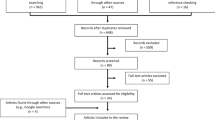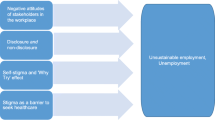Abstract
Objectives
Social support at work is associated with reduced risk of illness and sickness absence. Identifying determinants of social support at work is, hence, important. The objective of this study was to determine the relationship between service sector and level of social support at work in nurses' aides.
Methods
A random sample of nurses' aides, organised by the Norwegian Union of Health—and Social Workers, was mailed a questionnaire in 1999. Of 12,000 recipients, 7,478 (62.3%) completed the questionnaire. The 6,234 vocationally active, female respondents comprised the sample of this study. Perceived social support at work was assessed by scales in the standardised questionnaire, the General Nordic Questionnaire for Psychological and Social Factors at Work (QPSNordic). Each service sector was compared with all other sectors. Because of multiple comparisons, the significance level was set at 0.01, and 99% confidence intervals were used.
Results
The following associations were found, after adjustments for age and work schedule: high levels of support from the immediate superior were reported more often by aides in the psychiatric sector [odds ratio (OR) 1.72; 99% confidence interval (CI) 1.29–2.29] and community-nurse service (OR 1.22; CI 1.01–1.48), and less often by aides in nursing homes (OR 0.67; CI 0.58–0.77). Encouraging and supportive culture in the work unit was reported more often by aides in the psychiatric sector (OR 1.55; CI 1.13–2.13), and less often by aides in nursing homes (OR 0.79; CI 0.69–0.92).
Conclusions
In nurses' aides, perceived level of social support at work varies with service sector. Differences in organisational structure, personnel resources, and work tasks could explain the results. It is essential that managers in nursing homes put more emphasis on creating a supportive culture in their work units. Reorganisation and training of personnel could be elements of this effort. Higher grants may also be needed.
Similar content being viewed by others
References
Bourbonnais R, Comeau M, Vézina M (1999) Job strain and evolution of mental health among nurses. J Occup Health Psychol 4:95–107
Dallner M, Elo A-L, Gamberale F, et al. (2000) Validation of the General Nordic Questionnaire (QPSNordic) for Psychological and Social Factors at Work. Nord 12
Eriksen W, Bruusgaard D (2002) Physical leisure-time activities and long-term sick leave: a 15-month prospective study of nurses' aides. J Occup Environ Med 44:530–538
Eriksen W, Bruusgaard D, Knardahl S (2003) Work factors as predictors of sickness absence. A 3-month prospective study of nurses' aides. Occup Environ Med 60:271–278
Hoogendoorn WE, van Poppel MNM, Bongers PM, et al. (2000) Systematic review of psychosocial factors at work and private life as risk factors for back pain. Spine 25:2114–2125
House JS (1981) Work stress and social support. Addison Wesley, Reading, MA
House JS, Landis KR, Umberson D (1988) Social relationships and health. Science 241:540–544
Karasek R, Brisson C, Kawamaki N, et al. (1998) The Job Content Questionnaire (JCQ): an instrument for internationally comparative assessments of psychosocial job characteristics. J Occup Health Psychol 3:322–355
Lynch DJ, Schaffer K (1989) Type A and social support. Behav Med 15:72–74
North FM, Syme SL, Feeney A, et al. (1996) Psychosocial work environment and sickness absence among British civil servants: The Whitehall II study. Am J Public Health 86:332–340
Smith TW, Frohm KD (1985) What's so unhealthy about hostility? Construct validity and psychosocial correlates of the Cook–Medley Ho scale. Health Psychol 4:503–520
Acknowledgement
This study was supported by the Norwegian Research Council, EXTRA funds from the Norwegian Foundation for Health and Rehabilitation fund, The Norwegian Ministry of Health and Social Affairs, Rhône-Poulenc Rorer Ltd., Peter Møller, AS, and the Dr. Trygve Gythfeldt Research Fund.
Author information
Authors and Affiliations
Corresponding author
Rights and permissions
About this article
Cite this article
Eriksen, W. Service sector and perceived social support at work in Norwegian nurses' aides. Int Arch Occup Environ Health 76, 549–552 (2003). https://doi.org/10.1007/s00420-003-0447-4
Received:
Accepted:
Published:
Issue Date:
DOI: https://doi.org/10.1007/s00420-003-0447-4




